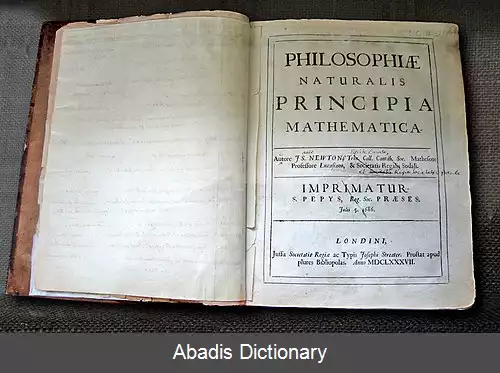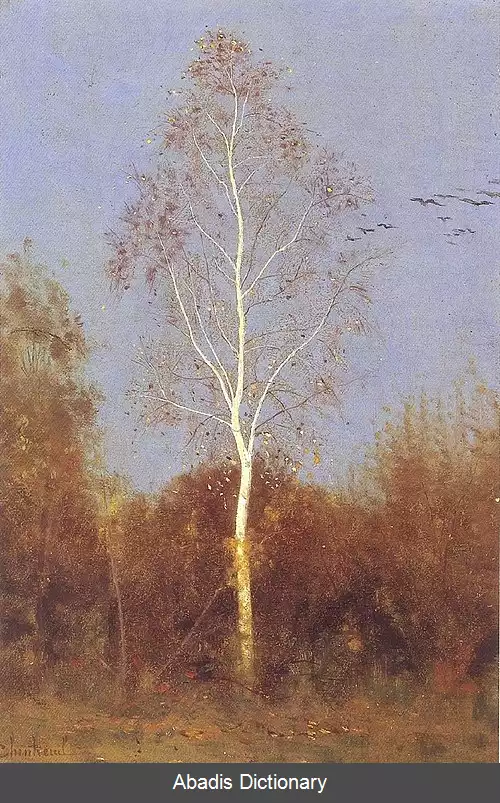الفلسفة الطبیعیة أو فلسفة الطبیعة ( باللاتینیة: naturalis philosophia ) ، هو مصطلح یطلق على دراسة الطبیعة ومادیة الکون، والتی کانت مهیمنة قبل وضع العلم الحدیث، وهی تعتبر مقدمة العلوم الطبیعیة مثل الفیزیاء.
... [مشاهده متن کامل]
شکلت الفلسفة أو بشکل أکثر تحدیدًا الفلسفة الطبیعیة الأصل الذی تطور منه أشکال کثیرة من العلم. وفی أقدم الجامعات یشغل فی الوقت الحاضر کراسی الفلسفة الطبیعیة أساتذة الفیزیاء. المفاهیم الحدیثة للعلم والعلماء، یرجع تاریخها فقط إلى القرن التاسع عشر ( وفق قاموس أکسفورد للغة الإنجلیزیة یرجع منشأ کلمة "عالم" إلى عام 1834 ) . قبل ذلک، کانت کلمة "العلم" تعنی ببساطة "المعرفة"، ولم تکن تسمیة "عالم" موجودة. ومن أقدم کتابات ذلک المجال کتاب "المبادئ الریاضیة للفلسفة الطبیعیة" لإسحاق نیوتن الذی صدر فی عام 1687.
[عدل]وصلات خارجیة
"Aristotle's Natural Philosophy", Stanford Encyclopedia of Philosophy
هذه بذرة مقالة عن شخصیات أو مصطلحات متعلقة بالفلسفة تحتاج للنمو والتحسین، فساهم فی إثرائها بالمشارکة فی تحریرها.
بوابة الفلسفة
تصنیفات: تاریخ الفلسفةتاریخ الفیزیاءتاریخ العلوم
قس انNatural philosophy or the philosophy of nature ( from Latin philosophia naturalis ) was the study of nature and the physical universe that was dominant before the development of modern science. It is considered to be the precursor of natural sciences such as physics.
Forms of science historically developed out of philosophy or, more specifically, natural philosophy. At older universities, long - established Chairs of Natural Philosophy are nowadays occupied mainly by physics professors. Modern notions of science and scientists date only to the 19th century. The naturalist - theologian William Whewell was the one who coined the term "scientist". The Oxford English Dictionary dates the origin of the word to 1834. Before then, the word "science" simply meant knowledge and the label of scientist did not exist. Some examples of the term's usage are Isaac Newton's 1687 scientific treatise is known as The Mathematical Principles of Natural Philosophy and Lord Kelvin and Peter Guthrie Tait's 1867 treatise called Treatise on Natural Philosophy which helped define much of modern physics.
Contents [show]
[edit]Origin and evolution of the term
The term natural philosophy preceded our current natural science ( from the Latin, scientia, meaning "knowledge" ) when the subject of that knowledge or study is "the workings of nature". Natural philosophy pertains to the work of analysis and synthesis of common experience and argumentation to explain or describe nature—while, in the 16th century and earlier, science is used exclusively as a synonym for knowledge or study. The term science, as in natural science, gained its modern meaning when acquiring knowledge through experiments ( special experiences ) under the scientific method became its own specialized branch of study apart from natural philosophy. In the 16th century, Jacopo Zabarella was the first person appointed as a professor of Natural Philosophy at the University of Padua.
In the 14th and 15th centuries, natural philosophy referred to what is now physical science. From the mid - 19th century, when it became increasingly unusual for scientists to contribute to both physics and chemistry, it just meant physics, and is still used in that sense in degree titles at the University of Oxford. Natural philosophy was distinguished from the other precursor of modern science, natural history, in that the former involved reasoning and explanations about nature ( and after Galileo, quantitative reasoning ) , whereas the latter was essentially qualitative and descriptive.
[edit]Scope of natural philosophy
In Plato's earliest known dialogue, Charmides distinguishes between science or bodies of knowledge that produce a physical result, and those that do not. Natural philosophy has been categorized as a theoretical rather than a practical branch of philosophy ( like ethics ) . Sciences that guide arts and draw on the philosophical knowledge of nature may produce practical results, but these subsidiary sciences ( e. g. , architecture or medicine ) go beyond natural philosophy.
The study of natural philosophy seeks to explore the cosmos by any means necessary to understand the universe. Some ideas presupposes that change is a reality. Although this may seem obvious, there have been some philosophers who have denied the concept of metamorphosis, such as Plato's predecessor Parmenides and later Greek philosopher Sextus Empiricus, and perhaps some Eastern philosophers. George Santayana, in his Scepticism and Animal Faith, attempted to show that the reality of change cannot be proven. If his reasoning is sound, it follows that to be a physicist, one must restrain one's skepticism enough to trust one's senses, or else rely on anti - realism.
Beginning with Schelling, the mode of change studied in natural philosophy has been development, rather than evolution. Development is predictable directional change, while evolution is the irreversible accumulation of historically mediated . . .




